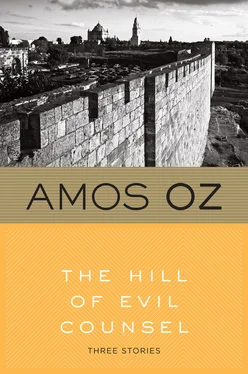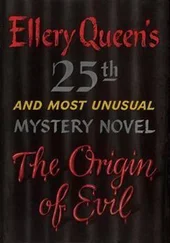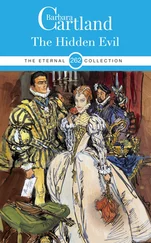And you are in my dreams, too. You in New York, in a youthful dress, in some paved square that reminds me of Moshavot Square in Tel Aviv. There is a jetty there, and you are at the wheel of a dusty jeep, smoking, supervising Arab porters who are carrying cases of arms for the beleaguered Hebrew community. You are on duty. You are on a secret mission. You are throbbing with efficiency or moral indignation. "Shame on you," you reproach me. "How could you, and at a time like this? Disgusting." I admit it, fall silent, recoil, and retreat to the far end of the jetty. Reflected like a corpse in the water, I hear distant shots and suddenly agree with you in my heart. Yes, you are right. How could 1.1 must go at once, just as I am, without a suitcase, without an overcoat, this very minute.
The shame is more than I can bear. I wake up in pain and take three pills. I lie down again, wide awake and alarmed, and hear outside, just beyond the shutters, on a branch, at a distance of perhaps two feet from me, a night bird. It is uttering a bitter, piercing shriek, in a kind of frenzy of wounded self-righteousness, repeating its protest over and over again: Ahoo. Ahoohoo. Ahoo. Ahoooo.
Jerusalem
Saturday evening
September 6, 1947
Dear Mina,
It will not be easy for me to wean myself from this child.
He spent the whole morning here, painstakingly copying facts out of the gazetteer and sketching a military plan for the capture of the mountain ranges that command Jerusalem from the north. Then he marked on his map the crossroads and the strategic points. On a separate sheet of paper, he allocated storm troops to each of the key buildings in Jerusalem, such as the central post office, the David Building, the radio station, the Russian Compound, the Schneller Barracks, the YMCA tower, and the railway station. And all the while he did not disturb me as I lay resting on the sofa. He is a thin, fair-haired child; his movements are abrupt, embarrassment and aspirations shine in his green eyes, but his manners are impeccable. Twice he interrupted his game and made me some coffee. He straightened my blanket and replaced the sweat-drenched pillow under my head with a fresh one. It was almost noon before he apologetically asked me my opinion of his work. Despite all my principles I praised it.
Uri said:
"I've got to go home soon and have my lunch. Please rest so you'll be strong enough to do the experiment tonight. I'm leaving a Matosian cigarette pack here, Dr. Emanuel; inside there are four live bullets we can take the gunpowder out of. And in my sock I've got the pin from a hand grenade. It's a bit rusty, but it's all there. I found it, and I've brought it for you. From our roof I counted nine British tanks in a shed in Schneller. Cromwells. Is it true, Dr. Emanuel, that a tank is finished if you put some sugar in the engine?"
Again the excited glint flickers in his eyes and dies down. He still trusts me, but his patience is beginning to wear thin: "How much more time will you need for the experiments? A fortnight? More? By about December the Irgun and the Stern Group will have started to blow up enemy districts in the city, because the English are already moving troops to Haifa."
I smile:
"There may still be an agreement, Uri. I read in the paper that America may yet agree to govern the country until the storm dies down and the Arabs start getting used to the idea of a He-brew state. There is still some such possibility. Why must you be so enthusiastic for wars? I have already explained to you more than once that a war is a terrible thing, even if you win it. Perhaps we shall still manage to prevent it."
"You don't really mean that. It's just because I'm still a child and you think you've got to improve me, like my daddy. But nothing comes from words. I'm very sorry. Everything is war."
"And how, if you don't mind my asking, did you arrive at that rather sweeping conclusion?"
Now he stares at me in utter disbelief. He stands up. His hands are thrust deep into the pockets of his shorts. He comes over to the sofa, and as he leans over me his voice is trembling:
"I'm not an informer. You can speak frankly to me. Surely everything is war. That's how it is in history, in the Bible, in nature, and in real life, too. And love is all war. Friendship, too, even."
"Are you acquainted with love already, Uri?"
Silence.
And then:
"Dr. Emanuel, tell me, is it true that there's a Jewish professor in America who has invented a huge atomic bomb made from a drop of water?"
"You are referring apparently to the hydrogen bomb. That lies outside the range of my knowledge."
"All right. Don't tell me anything. There are military secrets that I'm not allowed to know. The main thing is that you do know all about it, and no one will ever get a word out of me."
"Uri. Listen. You are quite mistaken about that. Let me explain something to you. Listen carefully."
Silence.
I don't know what to explain to him, or in what words.
It's not true:
The truth is that I am afraid of losing him. In his short trousers, with the buckle shining on his army belt, with his gentle hand once or twice on my forehead, am I still perspiring, have I got a slight temperature.
And so once again I give in. I start explaining to him what a chain reaction is and, in schematic terms, about the relationship between matter and energy. For a long while he listens to me in silent concentration, his eyes fixed on my mouth, his nostrils flaring as if they have caught a distant whiff of the fire storm in Hiroshima, which I am telling him about. Now he really worships me, he loves me with all his heart.
And now I feel better, too, as a result of his enthusiasm. Suddenly I feel strong enough to get up, to invite Uri into my little laboratory, I am suddenly animated by a kind of pedagogic enthusiasm, I light the spirit lamp and demonstrate a simple exercise to him: water, steam, energy, motor power.
"And that's the whole principle." I chuckle happily.
"My lips are sealed, Dr. Emanuel. I won't talk, even if the British arrest me and torture me, they won't get a word out of me, because I've got a way of keeping quiet that I learned from Ephraim Nehamkin. They won't get anything out of me about what you've told me, you can trust me a hundred percent."
Once more the beautiful rage flashes in his green eyes and dies away. My child.
Eventually he takes his leave and promises to come back tomorrow afternoon. And even in the middle of the night, if he sees a slanting crack of light at my bathroom window. In which case, he'll slip out and come to me at once. Hell be at my command, he says. Bye.
When he had gone, I suddenly began to argue with you in my mind. To apologize for it all. To justify myself about our first meeting. To re-examine how I went, two years ago, in the summer of '45, for a rest to the sanatorium at Arza. How I decided then, mistakenly, that my morning attacks of sickness were the result of general fatigue. How I made up my mind to relax completely, and how you came bursting into my solitary life, you and my illness. And as I reflected, I put the blame, if one can so express it, on you.
Dear Mina, if you mind my writing all this, then skip the next few lines.
Please. Try to see it like this: a bachelor, a doctor, with reasonable financial security, in receipt of an occasional mail remittance from his father, who is a confectioner in Ramat Gan. His expenditures are few: a moderate rent, simple clothing, and food in keeping with the times and his surroundings, the occasional expenses of his scientific hobby. He has a little put away.
Moreover, for some time now he has experienced a certain tiredness, and slight attacks of nausea early in the morning, before the first cup of coffee. A medical colleague diagnoses the first signs of ulcers and orders complete rest. Besides, certain European habits of his youth persist: summertime is holiday time.
Читать дальше











